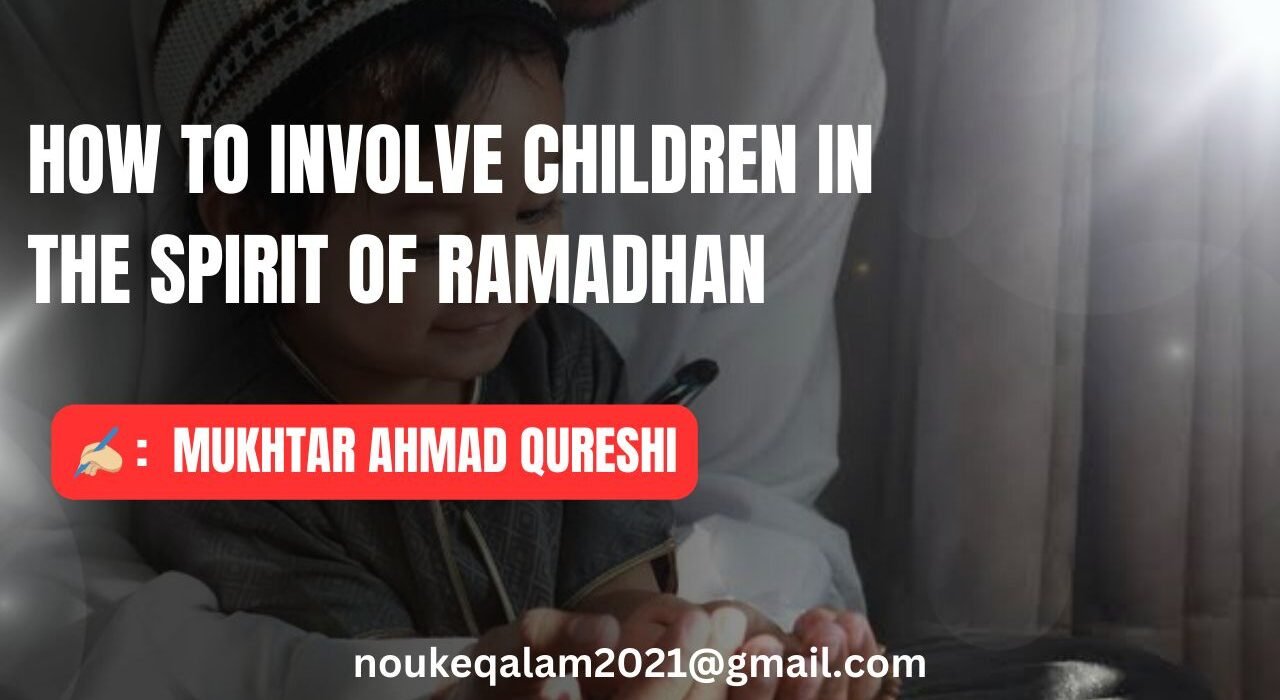Ramadhan is not just about fasting. It’s about purifying the soul and seeking closeness to Allah.
During Ramadhan, adults not only practice fasting and spiritual reflection but also use it as an opportunity to teach Islamic principles to their children. It’s our responsibility as parents, teachers, and members of society to share the authentic feeling of this blessed month with the younger generation. It takes education, creativity, and patience to get children involved during Ramadhan.
- Begin with Storytelling:
Stories are an innate part of children’s learning, and Ramadhan is a source of inspiration. The stories of the Prophets, including the life of Prophet Muhammad (PBUH) during Ramadhan, can be recounted. You can also share stories of charity, patience, and forgiveness with them. It’s common for children to be influenced by storybooks or storytelling before sleep, as I find it can make them feel good. - Design a Ramadhan Calendar:
A Ramadhan calendar is a fun and engaging way for children to mark the days of the month interactively. Every day, there might be an unexpected good deed challenge, a hadith, or even more appropriately, ‘a treat.’ The calendar is a source of excitement for my children as they explore it daily. To make it more personal, you can add activities such as helping a sibling, praying with someone, or contributing to charity. - Inspire Acts of Kindness:
Good and kind acts are encouraged during Ramadhan. Our children can be taught these traits by engaging them in small acts of kindness. It could be as simple as helping clean the iftar table, feeding neighbors, or making handmade cards with family members. Involving my children in the creation of food parcels for the underprivileged was heartwarming, and I can only attribute it to their happiness. - Make Fasting Fun and Gradual:
The idea of fasting can be introduced gently if your kids are not capable of fasting yet. Some of us practice a “half-day fast” or a “mini fast” for kids, where they fast for a few hours and then enjoy a special treat. You can also use a reward chart to acknowledge their efforts, with fewer restrictions on the duration of the fast. - Prepare for Suhoor and Iftar:
Cooking together is not only a useful survival skill but also enables people to bond. I frequently have my children help me wash fruit, prepare the table, or arrange iftar ingredients. Allowing them to select a dish or decorate the dining table adds more excitement. Additionally, it is an enjoyable activity that helps them feel more connected to Ramadhan rituals. - Educate Through Arts and Crafts:
Play and imagination contribute to children’s learning. Ramadhan-inspired arts and crafts can be done through lantern making, drawing mosques, or making Eid cards. It is possible to teach Islamic calligraphy or have them decorate prayer mats. My experience with my children was that it not only kept them engaged but also facilitated meaningful conversations about Ramadhan. - Organize a Prayer Corner:
A prayer area in our house can be a great way to encourage children to pray with us. You can involve them in setting up the area with a prayer rug, Quran, and some decorations. I noticed that my children were more interested in participating in prayers when they helped set up our prayer corner. It is possible to introduce brief surahs and duas to them in a supportive and enjoyable way. - Involve Them in Charity Work:
Ramadhan emphasizes the importance of charity, and engaging children in charitable activities can foster a sense of compassion and appreciation. When I participate in charity initiatives or help my children collect toys and clothing for the poor, I see their enthusiasm and involvement. - Engage in Community Events:
Whenever possible, taking children to community iftars or Ramadhan events can be a rewarding experience. They can witness the wider Muslim community in action and learn about the atmosphere of sharing and togetherness. When I took my kids to a community iftar, they were amazed by the diversity and hospitality of the crowd. You can also encourage them to attend mosque activities, such as Ramadhan quizzes or storytelling sessions. - Acknowledge Their Efforts and Progress:
When you celebrate your children’s accomplishments during Ramadhan, you increase their motivation. I ensure that I recognize their efforts, whether they fasted for a couple of hours, assisted with household chores, or were kind to others. You can even create a simple “Ramadhan Achievement Certificate” or hold a small family celebration. Positive reinforcement not only makes children feel appreciated but also enhances their connection to the essence of Ramadhan.
Involving children in the spirit of Ramadhan is all about instilling positive experiences that combine faith, fun, and family time. By teaching them the principles of fasting, prayer, and charity in an age-appropriate and innovative way, we establish the foundation for a lifetime of love for Ramadhan. As we lead them through this sacred month, our actions, stories, and shared experiences become precious memories they will carry forward. I hope that the approaches I have provided will encourage you to make this Ramadhan a special and spiritually rewarding time for your kids.
(The writer is a Teacher, Author, and Columnist. He hails from Boniyar, Baramulla, and can be reached at Mukhtar.qur@gmail.com.)






